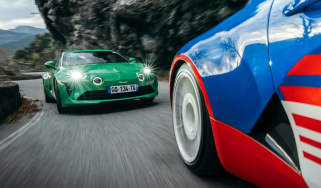Jaguar XF review – performance and 0-60 time
These are engines designed to go as fast as you need to, but no more. Don’t go expecting any M5-rivalling acceleration times
The four-cylinder diesel engine does an admiral job keeping pace with its German rivals. This is not in reference to outputs on paper, but rather that the new mild-hybridised diesel feels just as flexible and responsive. It is slower though, there’s no denying that, reaching 62mph in 7.8sec (the AWD option takes this up to 8sec) which is a solid 0.5sec behind a less powerful BMW 520d.
If you do decide to push the engine to the upper part of its rev range, its deterioration in refinement doesn’t equal increased performance. Much better to keep it below 3000rpm and save any disappointment.
> Ecurie Ecosse C-type homage series revealed
The petrol four-cylinders are no more refined or responsive oddly, and when kept within a normal operating window feel less muscular than the diesels. Push them and the performance is improved though, but one must explore the very upper reaches of the rev range, which is not a particularly pleasant experience.
The rear-wheel drive P250’s 6.9sec to 62mph acceleration isn’t particularly impressive, but the P300 all-wheel drive’s 6.1sec time is more admirable, although it doesn’t quite feel that fast in the real world. The engine note is largely muted – as it should be for a car of this type – but there is a grumbly undertone that’s neither premium nor sporty.




